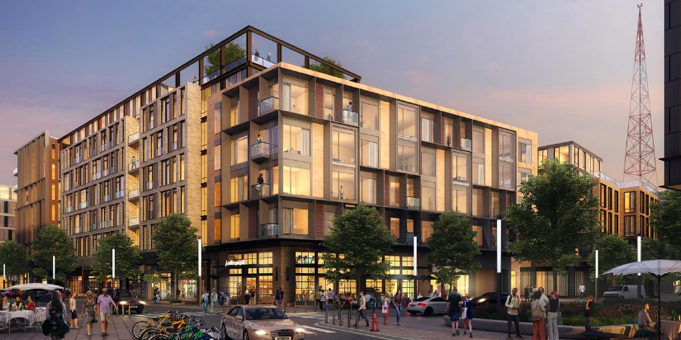People ask, “How can Green Newton support the Northland Newton development? After all, development is the opposite of green, right?”
Actually, no. Development is sustainable when it generates far fewer greenhouse gas emissions than comparable buildings. Sustainable development is extremely energy efficient. It reduces transportation emissions from residents and visitors and it uses land efficiently.
The Green Building Standards Committee promotes four green building principles: Passive House design, electric heating rather than gas heating, materials that have less embodied carbon (more wood and less steel, for example) and efficient transportation.
The Northland team agreed that at least their three largest multi-family buildings, comprising 35% of their housing units, will be Passive House certified. Their non-Passive House buildings will also have high performance building envelopes—making them extremely energy efficient. No natural gas will be used for heating and residential cooking, and their design team will minimize materials with high embodied carbon.
Northland had already planned a state-of-the-art transportation system—including a free shuttle to and from the Green Line every 10 minutes, 16 hours a day. The shuttle will be open to the public, using electric vehicles, in perpetuity.
In the meantime, Newton city councilors negotiated valuable changes to the original plan: underground parking, a much smaller building footprint, 140 affordable units, extensive open space, a major contribution to the Countryside School renovation and more.
If built today, Northland would be the largest Passive House development in Massachusetts. Each Passive House apartment will use 10 to 15 times less energy than a typical new single-family house. Parking will be limited, attracting tenants who want a single-car lifestyle. Electric vehicle charging, car-sharing, bicycling and walking will be facilitated. The state-approved traffic analysis, verified by Newton’s traffic consultant, predicts some impact, but much less than many imagine.
If this project is voted down on March 3, the progress we’ve made to make this development a model of environmental sustainability could disappear, and be replaced with a development under the state’s 40B law that would not require green buildings and open space.
The Northland Newton project will benefit Needham Street and Newton as a whole. Once built, it will provide better land use, more green space and added vitality. Importantly, it will benefit our children by reducing greenhouse gas emissions.
We will vote “Yes” on March 3.
Jim Purdy, Vice President, Green Newton Board
Dan Ruben, Chair, Green Newton Board



Recently on Twitter